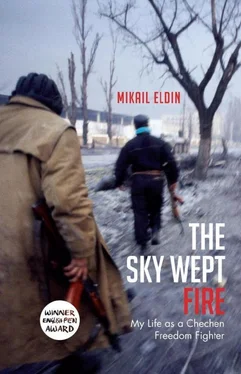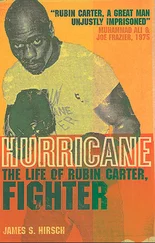Angel bought the whole lot and advised him not to sell his wares in the forest any more and to keep quiet about what he’d seen (though he only saw a few fighters standing guard). When I asked if he would indeed keep quiet and whether he wasn’t an agent, Angel replied, ‘He won’t talk. Why risk being charged with supplying us with “articles of food”? And he doesn’t look like an agent, just a man in desperate need. But even if he is an agent, it doesn’t matter. We’ll be gone from here in two days’ time.’
It’s a brutal night. And I’m frozen stiff. This is summer, but at an altitude of 3,700 metres above sea level there are constant blizzards, interspersed with occasional hail. My torso and feet aren’t freezing – I’m in a warm Gore-Tex jacket and boots – but I’m bitterly cold from the waist to the ankles. I have thin summer trousers on. Who knew we’d have to spend the night at such an altitude? And intensive walking in warm trousers is an absolute curse. A little below, at an altitude of 3,500 metres, amid the rocks and glaciers, is our camp. We’ve been camped there a week, under camouflage capes stretched across the rocks and invisible to enemy aircraft. We haven’t lit fires. In any case, there’s nothing to burn. Here, besides the glaciers all we have is the most astonishing rock formations, which are breathtakingly beautiful. The only vegetation is moss and edelweiss. These beautiful, strange flowers remind us that we’re still on earth. No mosquitoes or gadflies annoy us here, no blood-sucking insects of any sort; there aren’t even snakes. Nor is there water, but we do have glaciers. During the day they start slowly thawing in the sun and from under the ice mass water trickles out. That’s what we use for our needs. And the sun shines every day here – at least in the summer. Below is a sweeping panorama of magical beauty. Just beneath you the clouds are drifting gently, showering rain upon the earth that is ready to spring to life. And all around are mountains. My camera clicks away tirelessly. I photograph the extraordinary landscapes.
We camp here longer than usual to allow the enemy’s alarm at our sudden disappearance to subside. Here at the summit the enemy’s agents are automatically neutralized: they cannot send intelligence from here. We’re maintaining absolute radio silence, and if anyone were to turn on his radio, he’d blow his cover. The enemy have been shadowing us for a long time with their agents and air reconnaissance. At one point we drew close to the ambush laid for us (we were just an hour’s journey from the site) in order to register on their radar, that is, to flag up our presence at that location to the enemy reconnaissance, then we veered sharply to one side and walked all night in a forty-kilometre speed march before vanishing into a remote ravine. There we had to wait a few days for our battered and chafed feet to recover. After spending two more nights marching almost as fast, we find ourselves at the foothills to the glaciers. We climb up to the glaciers in a day. Along the way the guerrillas have to perform two rescue missions. A fighter falls from a precipice, catches hold of the rock and is left dangling over the abyss. They haul him up by lowering a volunteer on a rope to rescue him. And then two guerrillas get stuck on a thin ledge over an abyss. For their rescue a narrow path has to be hewed out in the rock – luckily not a long one. We hoist our pack horses up the mountain, after unloading the MANPADS, the Russian-manufactured Strela man-portable air-defence systems, which we now have to carry ourselves. The only animals in these parts are the Caucasian tur and the snow leopard. Our horses are visiting these glaciers for the first time. We’ve been surviving all this time on field rations. And we have with us a fellow member of my profession, although communication is somewhat tricky because of the language barrier. But sometimes we talk through an interpreter. This is British journalist Roderick John Scott, known simply as Roddy. Along with everyone else, he endures all the hardships of this trying journey with remarkable stoicism, which fills me with pride; my fellow journalist is a match for the seasoned partisans. He never complains and he dismisses any suggestion that he should turn back. His only complaints come when he is not allowed to film the fighters’ faces on his video camera. But he shows understanding of the rules of guerrilla warfare, where not everyone likes to give interviews with their faces on show. Whenever he is asked, ‘How are you?’ he always replies, ‘Good.’ He works unceasingly. Despite our large supply, the video camera batteries go flat. Our solar-powered chargers are effective for the radio sets, but the cameras are far more power-hungry. At one point, defying the danger of detection, I have to take several days out to travel from the camp to a friend’s house to recharge our batteries.
Today I’ve climbed ahead with the advance-guard scouts, who will be the first to descend from the glaciers. On the whole, I prefer to go with the reconnaissance group, as they are the first to go into action. And I also need to film the skirmishes. If I were at the tail of the column, I might not make it to the site of combat in time. So I need to be something of a scout myself. A fearsome blizzard is howling and the summit, licked clean by the winds and flat as an airfield, offers no place to shelter. There are not even glaciers or snow here – everything has been blown away by the powerful winds. Neither the thermal insulation mat nor the sleeping bag can save me. It occurs to me to get up and walk round in circles until morning. But I quickly realize this idea wouldn’t work. First, I’d waste a lot of energy – and there’s no telling what lies ahead on the journey. And second, I’d start to freeze, not from the low temperature, but from the icy winds – the wind chill would cancel out any chance of warming myself by moving about. If I take off my jacket and wrap it round my legs, I’ll soon feel like a lump of ice, because all I have under the jacket is a thin polo neck. But praise be to God! The summer nights – it’s August – are not very long and I’m still alive by dawn. And at dawn the group continues on its dangerous journey.
If you look up to the summit from which we’ve just descended, at the route which barely resembles a trail, it’s extraordinary to think we’ve just travelled this way. And the men were carrying not just their rucksacks and their personal weapons but also the heavy MANPADS missiles. The scene looks so sinister and terrible that a treacherous chill of fear creeps into my heart. The next day, the main column will traverse this route. Despite everything, we won’t lose a single man or horse, and not even one cartridge. No matter how tired, a guerrilla never discards any cartridges. A cartridge is your chance to survive the battle, a chance for the enemy to die before you do.
I often talk at length with the fighters, trying to understand what makes them endure such inhuman physical and psychological strain. What motivates them to condemn themselves to such a life? After all, despite the Russian claims that only a handful of criminals are left in the mountains, who have nothing left to hope for and nowhere else to go, the vast majority of these men (around 98 per cent) could legalize their positions easily enough and live a peaceful life. From all these conversations one conclusion emerges: they are fighting for freedom. They think it was a mistake for the Chechen volunteers to go to the aid of their ‘Dagestani insurgent brothers’, believing, quite reasonably, that it was a set-up, a pretext to begin a second war against Chechnya. They criticize Aslan Maskhadov’s policies in the three interwar years, but they remain convinced that Russia would have found an excuse to attack Chechnya in any case. I marvel at their profound, sincere faith in God. No, they don’t smack of radicalism, and they’re not fighting for their faith. I have met very few people in this war who are fighting for their faith. It’s simply that Islam says it is the duty of every Muslim to defend his home against aggressors. Russia has never felt like a home to the Chechens. A home is not about state boundaries or political ideologies. It is something that lives in the heart, something a person is born with and dies with. In the entire history of Russian-Chechen relations, the only time the Chechens viewed Russia as a common home was during the Second World War – and we all know what came of it.
Читать дальше












